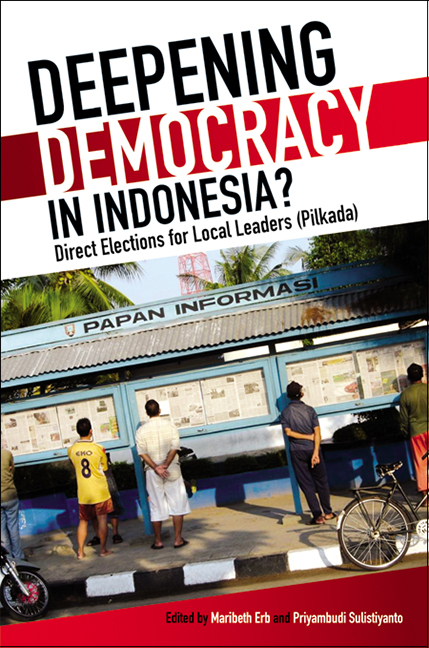Book contents
- Frontmatter
- Dedication
- Contents
- List of Tables
- List of Figures
- Contributors
- Acknowledgements
- Glossary
- 1 Indonesia and the Quest for “Democracy”
- 2 Pilkada Langsung: The First Step on the Long Road to a Dualistic Provincial and District Government
- Part I Political Parties, Politician Elites and the Voters
- 3 Political Parties in Pilkada: Some Problems for Democratic Consolidation
- 4 Batam's 2006 Mayoral Election: Weakened Political Parties and Intensified Power Struggle in Local Indonesia
- 5 The Rising Importance of Personal Networks in Indonesian Local Politics: An Analysis of District Government Head Elections in South Sulawesi in 2005
- 6 Pilkada, Money Politics and the Dangers of “Informal Governance” Practices
- 7 Electing District Heads in Indonesia: Democratic Deepening or Elite Entrenchment?
- 8 Gender and Reform in Indonesian Politics: The Case of a Javanese Woman Bupati
- 9 Pilkada in Bantul District: Incumbent, Populism and the Decline of Royal Power
- Part II Media and Campaigns: Comparing Local and National Elections
- Part III Conflict, Ethnicity, and Political Divisions
- Index
3 - Political Parties in Pilkada: Some Problems for Democratic Consolidation
from Part I - Political Parties, Politician Elites and the Voters
Published online by Cambridge University Press: 21 October 2015
- Frontmatter
- Dedication
- Contents
- List of Tables
- List of Figures
- Contributors
- Acknowledgements
- Glossary
- 1 Indonesia and the Quest for “Democracy”
- 2 Pilkada Langsung: The First Step on the Long Road to a Dualistic Provincial and District Government
- Part I Political Parties, Politician Elites and the Voters
- 3 Political Parties in Pilkada: Some Problems for Democratic Consolidation
- 4 Batam's 2006 Mayoral Election: Weakened Political Parties and Intensified Power Struggle in Local Indonesia
- 5 The Rising Importance of Personal Networks in Indonesian Local Politics: An Analysis of District Government Head Elections in South Sulawesi in 2005
- 6 Pilkada, Money Politics and the Dangers of “Informal Governance” Practices
- 7 Electing District Heads in Indonesia: Democratic Deepening or Elite Entrenchment?
- 8 Gender and Reform in Indonesian Politics: The Case of a Javanese Woman Bupati
- 9 Pilkada in Bantul District: Incumbent, Populism and the Decline of Royal Power
- Part II Media and Campaigns: Comparing Local and National Elections
- Part III Conflict, Ethnicity, and Political Divisions
- Index
Summary
INTRODUCTION
On Saturday 29 April 2005, the city of Tuban, East Java province, was burned. A huge crowd consisting of more than 5,000 supporters of the defeated pilkada candidate went down to the street angry. The crowd destroyed and burned the local electoral commission's (KPUD) office, district government offices and vehicles, and the pilkada winner's property, including two luxury houses, a hotel, eighteen vehicles, and two factories. A state of emergency was declared by the government, and thousands of police officers were mobilized with a licence to shoot disturbers.
This may be an example of what the government feared would be “unsmooth and disorderly” local head elections throughout the country. Since public pessimism over the implementation of the pilkada had been increasing from early on, the Minister of Home Affairs announced the success of pilkada in 2005 in influential mass media across Indonesia on December 2005. “Since June 2005, pilkada has been executed in 198 regions, 92 per cent of them were run in a smooth and orderly manner.” Of course, this used a minimum standard to define a “successful pilkada”.
Theoretically, the direct election of governors, district heads, and mayors is expected to further deepen democracy at the regional level. By this new electoral system, the heads of regions are no longer elected by regional assembly members, but are elected by individual citizens. Instead of taking a role in regional legislatures through their representatives, individual citizens now have direct access to vote for their governor, bupati (district head) or mayor. It will be argued in this chapter, however, that the path toward deepening democracy has not been significantly furthered by these direct elections, because of the electoral and party system which constrains grassroots participation. Nevertheless, it is suggested that voters at the grass-roots level are finding their own way to respond. Whether this response will have a positive effect towards the furthering of the democratic transition in Indonesia will be something to be examined further in the future.
- Type
- Chapter
- Information
- Deepening Democracy in Indonesia?Direct Elections for Local Leaders (Pilkada), pp. 53 - 73Publisher: ISEAS–Yusof Ishak InstitutePrint publication year: 2009

